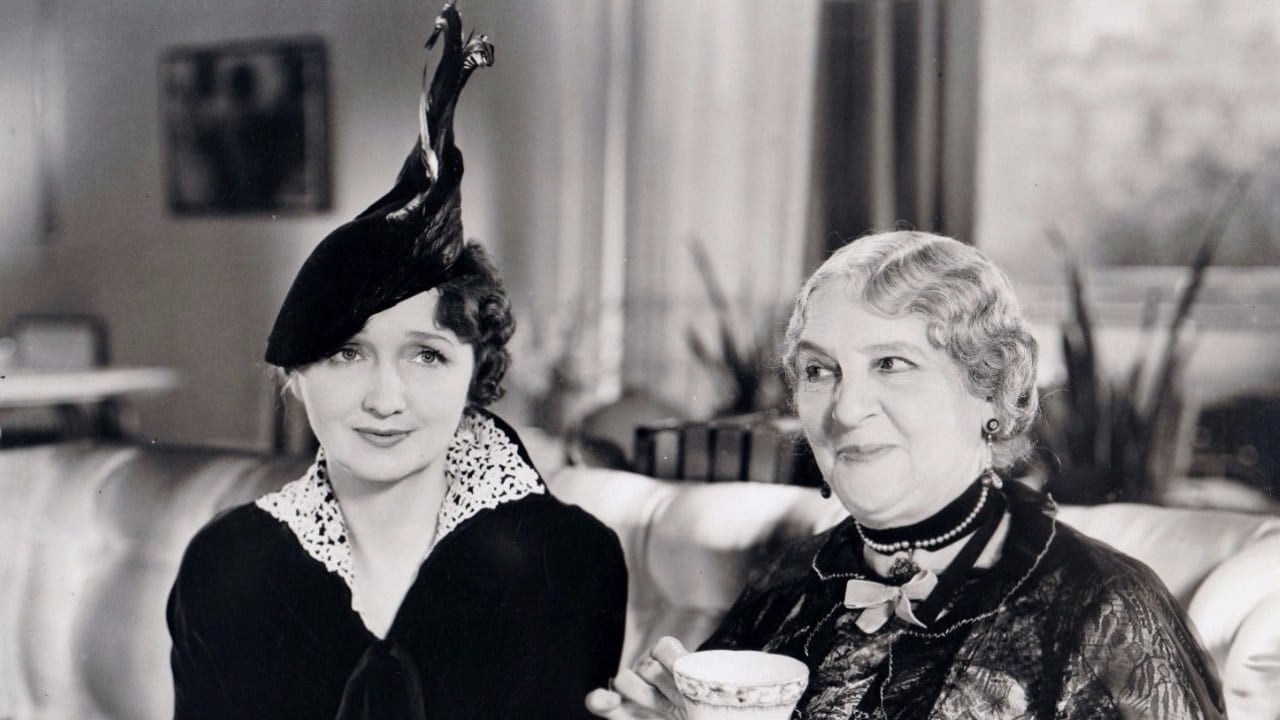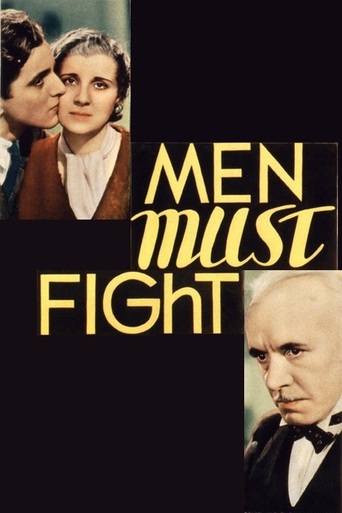



i know i wasted 90 mins of my life.
Better Late Then Never
Absolutely Fantastic
The acting is good, and the firecracker script has some excellent ideas.
View MoreFor some reason, a lot of the reviewers on IMDb want to praise this mealy-mouthed pseudo-liberal talk-fest. Maybe this is because heroine Diana Wynyard makes a number of decent anti-war speeches throughout this film. In any event, I will admit Diana Wynyard is a good actress and did a good job in this film, and I appreciated the opening scene, a pre-code artifact indicating that Miss Wynward and Robert Young had engaged in pre-marital sex. However, although the writer of Miss Wynyard's speeches misses entirely some of the most salient points of the anti-war point of view:1. That war is often fought for the benefit of profiteers 2. That politicians goad nations to war by means of lies 3. That politicians, no matter what they say, generally seek empire when they go to war 4. That women, children, the sick, the poor, the elderly, and the disabled suffer the most when war is foughtThat a film described by some as anti-war misses these and other major points is akin to giving the Nobel Peace Prize to a world leader who bombs weaker nations and sends drone weapons against civilians. In fact, Miss Wynyard's character tends to trivialize the anti-war point of view by representing that point of view as a mere response to acute grief. NYC is attacked in this film, in an eerie foreshadowing of 9/11, but the film says nothing about the actions leading up to the attack, the motivations of the attackers, or whether or not US politicians knew in advance of the attack (as Pres. Roosevelt did in the case of Pearl Harbor, but was looking for a justification to enter WWII). War is represented then, not so much as the result of plans and actions and motivations, all of which should be deconstructed if we are ever to learn from history, but rather as a kind of Force of Nature, a unavoidable part of human experience, such as sex and love are. Hence the title. War as an expression of the human spirit. In case you still might think this film is anti-war (Spoiler Alert!) then consider the fact that at the film's end, Miss Wynyard's son resolves his story arc by enlisting to fight in a jingoistic crescendo of inanity.I'm busting on this film so bad because others in this time period knew the straight scoop on war. Graham Greene did, hence his classic 1936 novel 'This Gun for Hire.' Smedley Butler did, and he had already written the classic 'War is a Racket.' In terms of cinema, the Marx Bros 'Duck Soup' and Chaplin's 'The Great Dictator' are much more articulate regarding the subject of war and peace. Actually, 'The Shape of Things to Come' is also better on the subject as well. This film is mostly just a curiosity. It's eerie that it predicted the USA entering into a European war in 1940, and it's eerie that it showed an attack on NYC, it's got funky video-telephones for futuristic 1940, and it's got a hint of pre-code sex. But it's slow, talkative, and in the end fakes you out because you think the point of view is pro-peace, but in the end, it's just more cheer-leading for the War Machine. Like we need that.
View More'Men Must Fight' is one of the most astonishing and audacious films I've ever seen. This 1933 drama boldly predicted a second world war (in 1940!) at a time when many Americans were actively planning to sit out such an event. This film depicts an aerial attack upon Manhattan, in a sequence that seems startlingly precognitive for viewers watching after the 9/11 WTC attack. Even more bizarrely, this movie prefigures the real-life deaths of two of the leading actors in its cast.Diana Wynyard stars as Laura Mattson, a Red Cross nurse in the Great War. She has a brief fling with a handsome aviator who then conveniently dies. Rising diplomat Edward Seward (the excellent Lewis Stone) realises that Laura is pregnant by the pilot but unmarried; he proposes to her and offers to raise the child as his own son. Laura doesn't love Seward, but knows this is the best option for herself and her child.Lap-dissolve to the future year 1940 ... seven years *after* this movie was released. There is some astonishing art direction here, with the female characters wearing slightly Jetson-ised fashions, and picturephones in every home. Seward's fortunes have risen, and he's now the Secretary of State. Laura has raised her son Bob to adulthood whilst allowing him to believe that Seward is his biological father. Meanwhile, a foreign alliance called the Eurasian States are gearing up for war against America.Having seen the toll of war, Laura organises a women's pacifist league to prevent World War Two. In a 'Lysistrata' gambit, she persuades the mothers of America to refuse to donate their sons to the juggernaut of war. The film's title has an unspoken counterpoint: men must fight ... and women must make peace. Bob joins his mother in her pacifist campaign. This proves an embarrassment for Secretary of State Seward, especially when a mob of protesters show up to fling stones at his house while haranguing Laura and Bob as 'yellow-bellies'.SPOILERS COMING. Eventually, the Eurasian States' warplanes attack New York City, destroying the brand-new Empire State Building and other landmarks. The special effects in this sequence are marginally better than in 'Deluge' (another film of this period in which Manhattan was destroyed). Despite the technical flaws, for post-9/11 audiences these scenes are absolutely riveting, and it's impossible to sit through this sequence without being reminded of Osama bin Laden's terrorist attack.Eventually, Bob learns that his actual father was a war hero. This and the assault on Manhattan are enough to persuade him to change his ways. He joins the army and becomes a fighter pilot, willing to die to keep America free. War is inevitable, and therefore men MUST fight.'Men Must Fight' sets out to be unnerving, and succeeds. Yet it's more unnerving than it meant to be, due to its distressing precognition. The assault on Manhattan eerily prefigures the events of 2001. Even eerier are the real-life fates of this film's two lead male actors. During the sequence in which hooligans stone the house of Lewis Stone's character, I recalled how Lewis Stone would die 20 years after this film was made: some boys threw stones at his house, and he dropped dead of a heart attack in the street while chasing them. (Way back in 1920, in the silent film 'Milestones', Lewis Stone played yet another character whose house is stoned by hooligans!) Even more unnerving is the ending of 'Men Must Fight', in which Bob Seward (Phillips Holmes) renounces his pacifist ways to become an aviator. In real life, Holmes gave up his movie career early in WW2 to join the Canadian Air Force as a fighter pilot, and he died during a flight exercise. The spectre of Holmes's real-life death hangs over his fictional character in this film, giving it a powerful undertone of morbidity. I usually dislike Phillips Holmes, who tended to play neurasthenic weaklings. His role in 'Men Must Fight' forces me to recall that this actor died a hero's death in real life, and that he should be remembered accordingly.'Men Must Fight' is an astonishing and audacious near-future drama, made even more powerful by the real-world events which have overtaken it. I'll rate this movie 10 out of 10. God bless America and keep her people safe.
View MoreThe future (1940) as seen from the vantage point of 1933. A movie about preparedness for war, the main characters are woman who became a pacifist after her beau died in WWI; her husband, the Secretary of State, a pacifist who turns hawk when war is imminent; her son, also a pacifist, who disappoints his stepfather by refusing to use his knowledge of chemistry to create better poison gases ("the weapon of the future"); the boy's fiance, who refuses to continue the engagement because the boy won't join in the war effort; a dotty pacifist grandma; and Hedda Hopper as the girl's hawkish mom.With a bizarre cast of characters like this, you can just imagine the plot. It takes the destruction of the Brooklyn Bridge and the Empire State Building, plus the revelation that his real father was a war hero, plus the abandonment by his stepfather, to make the pacifist son realize that he must fight, and likely die (as the enemy, Eurasia, has already invaded New York and seems to be equipped with deadly poison gas).This is a gem, and thank god we have oddball cable stations that show such stuff in the middle of the night. It is a movie about patriotism that exalts ambivalence, which is the strongest feeling that most of us possess. Although ultimately the movie comes down on the side of the fighters ("Men Must Fight"), the notion that it would be better for all nations (led by the world's mothers) to refuse to go to war is a major theme of the movie. It is mildly based on Lysistrata.The sci-fi elements stand out as particularly amusing from the vantage point of 2003: both television and picture phones are the norm, but nothing else (and especially the grand old prop planes) is the least bit modern. The prediction that whoever controls poison gas controls the world is in line with the misguided Sadaam-aphobia of our own decade.For any number of reasons, this flick is well worth watching.
View MoreI enjoyed some of the anti-war sentiment in this film, despite a muddled point of view that also included strong hawkish sentiments. The bombing of New York in 1940, with special effects showing the collapse of the Brooklyn Bridge and the Empire State Building, was interesting but clearly done with miniatures. Considering this was a 1933 film, it came pretty close to predicting the actual start of WWII. And it must have been fun for 1933 audiences to see a television set and video telephones on screen. Performances were excellent, with Lewis Stone a standout as Secretary of State, Diana Wynyard as his dovish wife who lost her lover (Robert Young) in WWI, and Phillips Holmes as their son, caught in the middle of his parents' beliefs. Ironically, Holmes was actually killed in WWII from a mid-air collision.
View More